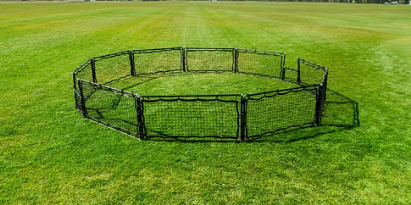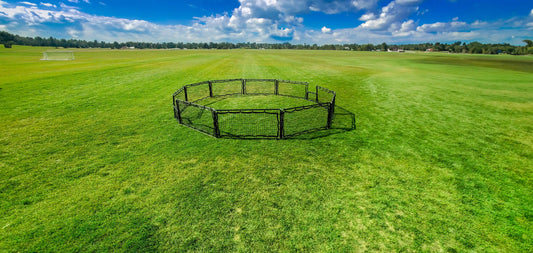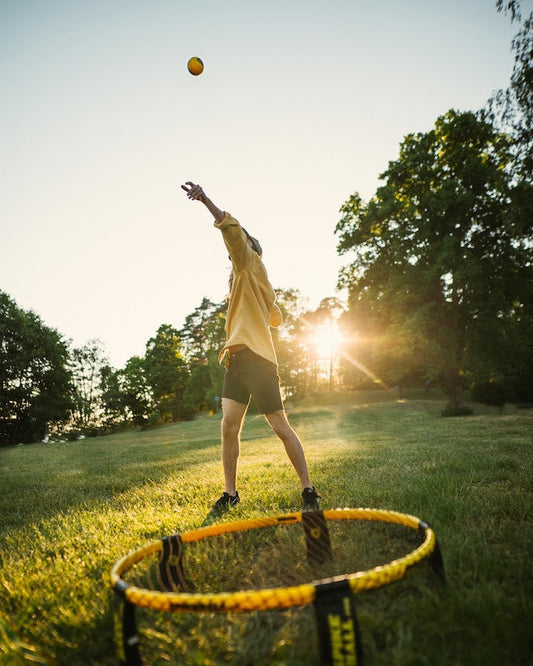A cookout is an outdoor gathering or party where food is cooked and eaten outside, typically on a grill or barbecue. It is a popular social event during warm weather months, especially in the United States, where it is a tradition to have cookouts for holidays like Memorial Day, Independence Day, and Labor Day. Cookouts often involve a variety of grilled or barbecued foods such as burgers, hot dogs, chicken, and ribs, as well as side dishes like potato salad, coleslaw, and baked beans. It is also common for guests to bring their own dishes to share, making it a potluck-style event. Overall, a cookout is a fun and casual way to enjoy good food, drinks, and company in an outdoor setting. Cookouts often include a variety of different games, some for smaller groups like spades or giant jenga, and some for larger groups like 9 square or capture the flag. A good game for size groups is tug of war. Just in case you aren’t sure how to play some of these games, let's break them down.
- Spades - Spades is a popular trick-taking card game that is played with a standard deck of 52 playing cards. It is typically played by four players in two partnerships, with partners sitting across from each other. The objective of the game is to be the first team to reach a predetermined score, usually 500 points. Points are earned by winning tricks, which are each comprised of four cards played by each player in turn. At the beginning of each round, players bid on the number of tricks they believe their team can win. The total number of tricks bid by each team must be equal to the total number of tricks available in that round (13). The team that wins the bid becomes the "declarer" and must try to win at least as many tricks as they bid. Spades are the trump suit in the game, which means that they are the highest-ranking suit and can beat any other suit. Players must follow suit if possible, but if they cannot, they may play a spade or any other card. The game continues until one team reaches the predetermined score, at which point that team is declared the winner. Spades is a strategic game that requires both skill and luck. It is a popular game among card players and can be played for fun or in competitive tournaments.

- Giant Jenga - Giant Jenga is a popular party game that is a variation of the traditional Jenga game. In this game, players take turns removing wooden blocks from a tower and placing them on top, without causing the tower to collapse. The main difference between traditional Jenga and Giant Jenga is the size of the blocks. In Giant Jenga, the blocks are much larger than the standard Jenga blocks, often measuring around 8 to 12 inches in length. To set up the game, the blocks are stacked in a tower formation, with each layer consisting of three blocks placed perpendicular to the previous layer. The blocks are then stacked in alternating directions, forming a square tower. Players take turns removing one block at a time from the tower and placing it on top of the tower, creating a taller and more unstable structure. The game continues until the tower collapses, and the player who caused the collapse is deemed the loser. Giant Jenga is a fun and exciting game that requires a steady hand and careful strategy. It is popular at parties, barbecues, and other social events, and can be played by people of all ages. The larger blocks and taller tower create a unique challenge and can add an extra element of excitement to the game.

- 9 Square - 9 Square is an outdoor game that is played with a large inflatable or metal frame that is divided into nine smaller squares. Each player stands in their own square, and the objective of the game is to eliminate players from other squares by bouncing a ball into their square. The rules are, Set up the frame and divide into nine squares, with each player standing in their own square. The player in the center square starts the game by bouncing the ball into one of the other squares. The player in that square must hit the ball into another square, and so on. If a player fails to hit the ball into another square, they are eliminated and must leave the game. Variations of the game include adding rules such as no holding the ball or no hitting the ball with the same hand twice in a row.

- Capture the flag - Capture the flag is an outdoor team game that is typically played with two teams. The objective of the game is for each team to capture the other team's flag and bring it back to their own base without being tagged by the opposing team. The rules are, Divide into two teams and designate each team's base. Each team should also have a flag that they will try to protect. The two teams then try to cross over into each other's territory and capture their opponent's flag. If a player is tagged by an opposing team member, they must go to "jail" or a designated area of the opponent's territory. A player can be released from jail if a teammate is able to tag them. The game ends when one team is able to successfully capture the other team's flag and bring it back to their own base without being tagged by the opposing team. Variations of the game include adding obstacles, allowing players to carry multiple flags, or playing with multiple teams.
- Tug of War - Tug of war is another classic game that can be enjoyed by groups large and small. Two teams line up on opposite sides of a rope and try to pull the other team across a designated line. It's a great way to promote healthy competition and teamwork.
- Gaga Ball - Another great game for a cookout, especially for those who want a little more competition is Gaga Ball. It has some elements of dodgeball, but usually safer.
Cookouts are a great opportunity to gather with friends and family to enjoy good food and company. Adding games to the mix can create a fun and engaging atmosphere, and can help to break the ice and encourage everyone to get involved. From classic games like cornhole and giant Jenga to water balloon tosses and relay races, there are plenty of options to choose from to suit your group's interests and preferences. So, the next time you host a cookout, consider incorporating some of these games to make it an even more memorable and enjoyable experience for all.







